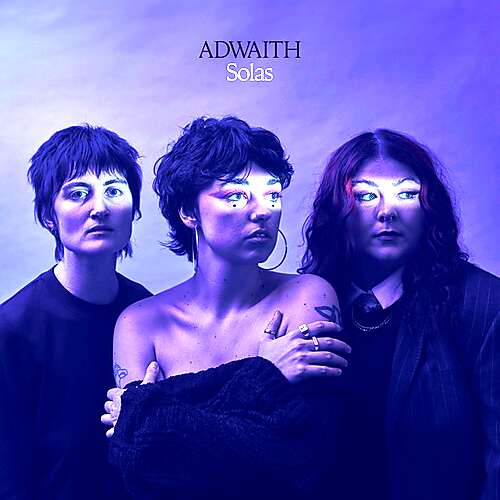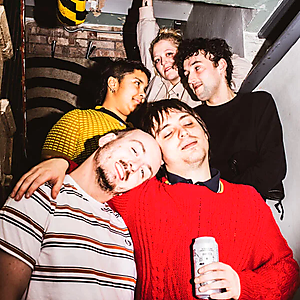|
"We wanted to create a big indie pop song that has a melancholy feel to it" say the band. "It's about being worried that life is going too fast or the worries of a relationship, the overwhelming feeling that you're not good enough and that you are the reason things aren't working out."
They continue, "The concept of the video is all about anxiety, feeling detached from the world, feeling like you're the problem always. All these emotions that are very apparent in your early 20's. We worked with Eilir Pierce to create this video as we wanted it to be more dramatic and heartfelt than our other videos."
More about Bato Mato
Speeding into the frosty outer reaches of Russia on the Trans-Siberian Express – the longest railway line in the world – Welsh art-rock band Adwaith suddenly felt a long way from their home back in Carmarthen. Shown the way by their trusty guide Bato Mato as a frozen-over Lake Baikal whipped past the windows, the trio eventually wound up in the bracingly cold city of Ulan-Ude. The pavements were deserted as locals battened down against the chill, lending the grand, brutalist streets a kind of isolation. “I strangely saw similarities between there, and Carmarthen,” says drummer Heledd Owen. “You could kind of sense this loneliness. It felt like this empty city.”
As Adwaith travelled further into Eastern Europe, the trip transformed into a voyage of creative discovery. While the band’s debut album Melyn – which won the prestigious Welsh Music Prize in 2019 – was a musical bildungsroman, dreaming of the possibilities of adulthood, Bato Mato looks in the mirror and sees stark reality biting. Matching Singer’s explorative lyrics, which yearn for a simple life and “a place to call my own”, Adwaith’s songs constantly shift and evolve, searching for a steady pulse that never sticks. Loose and jam-like in structure, the band were heavily influenced by the psychedelic sense of foreboding conjured by late-’60s Krautrock bands Can and NEU!
The band’s memories of speeding through Russia have seeped into the fabric of their second record Bato Mato – the industrial chug powering tracks like ‘Yn Y Swn’ or ‘Anialwch’ recall the relentless pistons of the high-speed train they boarded. “There's no one on the street but me,” sings Hollie Singer on its opening track ‘Cuddio’, returning once more to the abandoned streets of Ulan-Ude.
“It was a life changing trip that really inspired us to write this album,” explains bassist Gwenllian Anthony. “The barren landscape and brutalist architecture really seeped into these songs and the use of world instruments was heavily inspired by this journey". “Our journey through the Siberian and Mongolian wilderness influenced the writing and sound of the album to be as open and big as the limitless sky around us there,” says Singer.
Though they had already begun work on a follow-up to debut album Melyn the band immediately canned the whole lot upon their return to rural west Wales as the pandemic hit. Instead, the trip brought about a whole new vision, and separately locked down in different houses, Adwaith began work on a release that dived deep into the isolation and confusion of navigating the messy landscape of your early twenties. The result is the thorny and boundary-pushing Bato Mato. It’s their most direct work to date.
“Our first album was very much about growing up in west Wales and going from teenagers to adults,” says Anthony. “This is the next step in our journey: shit, this is life. We hit reality.”
Owen, Anthony and Singer all grew up in or around Carmarthen and attended Welsh-language schools. Growing up, beloved local music venue The Parrot lay at the core of the town’s rich and tight-knit music scene, and bands performing in Welsh was the norm, too. When it came to forming the band back in 2015, the trio instinctively knew that they wanted to join the long lineage of acts in the country challenging the dominance of English music. “It’s a small, experimental scene, and you don’t feel like you have to subscribe to a certain style” Anthony says of their shared hometown. “I remember seeing Gwenno play at [Welsh-language music festival] Eisteddfod, and I hadn’t seen many women performing in the Welsh language before. Watching those shows really solidified that we could do something with Adwaith. As we progress, we’ve realised how important it is to carry on singing and writing in Welsh."
With an ethos that’s strongly aligned with international acts past and present – multilingual acts like Can and Khruangbin who often use languages like instruments – Adwaith’s music wields Welsh in a direct, muscular manner, despite its initially soft edges. “It takes and it takes,” they sing in Welsh on ‘ETO’, “that's what love is.” That track’s title was chosen to represent a punchy, memorable hook that transcends traditional borders of understanding – “we want to take our language around the world,” Anthony says.
A melting pot of influences, Bato Mato draws on a broad palette, ranging from the avant-garde work of Welsh experimentalists Datblygu to the Gothic post-punk palettes of Siouxsie and the Banshees, and the gloomy fuzz of Belly and The Breeders. Above everything else, it’s infectiously fun; inspired by the comradery of bands like The Slits, everyone’s invited to join the party.
Accordingly, you don’t have to be a Welsh-speaker to recognise the hopeful parting of the clouds that arrives on penultimate track ‘Amser Codi’ nor the swooning infatuation of its closing love song ‘ETO’ with its sugary ‘Yé-yé-style call-and-response vocals. Dig into the bracken of the lyrics, meanwhile, and Adwaith continually play with convention. Named after a popular Welsh saying - “Not everything yellow is gold” – ’Nid Aur’ reels off a series of oft-repeated idioms, and finds weight in their familiar shapes. “Slow and steady wins the race,” Singer recites, pulling from Aesop's Fables, and its well-known story The Tortoise and the Hare. “Numbness makes me feel better”.
Mostly recorded in Giant Wafer studios in Llandrindod Wells, a community in mid-Wales, Adwaith reunited with ‘Melyn’s producer Steffan Pringle (Estrons, Boy Azooga) for their second record, as well as teaming up with whenyoung collaborator Gethin Pearson for ‘ETO’.
Though Bato Mato was made in Wales alongside a tight-knit circle of collaborators, it’s ultimately inspired by the limitless possibilities of the world at large – and the agony of having to choose a path as adulthood rears its head. It stands as a guide for anybody taking their own epic trip into the unknown, just as Adwaith did in order to create it.
|

 Single
Single
 Single
Single
 Single
Single
 LP
LP
 Single
Single
 Single
Single
 Single
Single



















